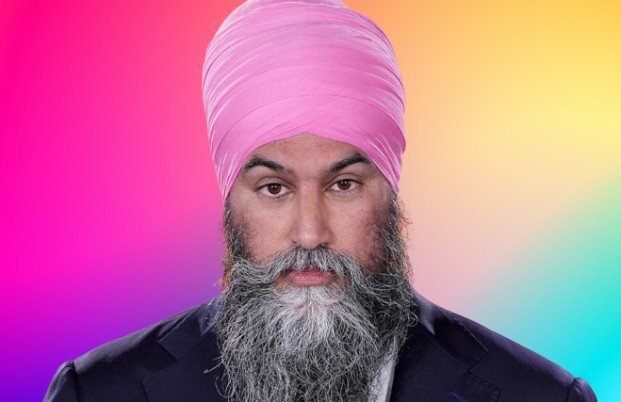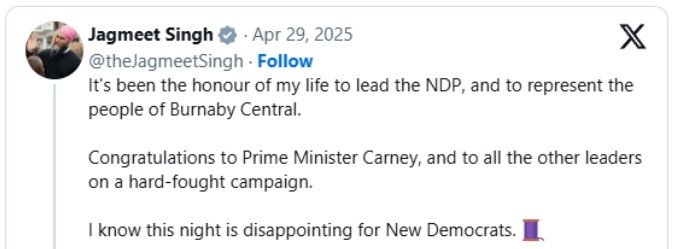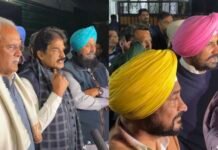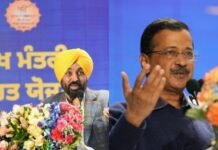Saptrishi Soni: In an election dominated by trade tensions with the United States and growing scrutiny of nationalist rhetoric, one of Canada’s most visible political figures, Jagmeet Singh, has resigned from leadership of the New Democratic Party (NDP) after failing to secure his parliamentary seat and witnessing his party plummet to a historic low. The stunning defeat not only reshapes Canada’s political landscape but also opens a potential new chapter in the strained relationship between Ottawa and New Delhi.
Singh, a charismatic and controversial figure in Canadian politics, lost the Burnaby Central seat in British Columbia to Liberal candidate Wade Chang, garnering only 27 percent of the vote compared to Chang’s commanding 40 percent. For Singh, who was seeking a third term and had led the NDP since 2017, the loss was both personal and political — and ultimately terminal. Hours after the results came in, he announced his resignation, conceding that the party had not lived up to expectations.
“I know this night is disappointing for New Democrats,” Singh wrote on social media, before pivoting to a defiant message of hope. “We are only defeated when we believe those that tell us we can never dream of a better Canada.”
But beyond rhetoric, the numbers spoke louder. Under Singh’s leadership, the NDP’s once-promising role as a progressive force in federal politics has dwindled. From its past position as a potential kingmaker, the party was relegated to a distant fourth place in the 2025 elections, securing just seven seats — far below the 12 required to maintain national party status. By contrast, the Bloc Québécois claimed 23 seats, the Conservatives 147, and the governing Liberals 165.
Singh’s political career has long been marked by both historic milestones and simmering controversy. The first person of a visible minority background to lead a major federal political party in Canada, Singh brought with him a fresh, modern image — fluent in digital campaigning, unapologetically progressive on climate and inequality, and a visible symbol of multiculturalism in the Canadian mainstream. Yet that same visibility attracted scrutiny, especially as Singh became increasingly vocal in his support for the Khalistan movement — a Sikh separatist campaign long designated as extremist by India.
His repeated, unverified claims accusing Indian agents of involvement in the 2023 killing of Hardeep Singh Nijjar — a Canadian citizen and pro-Khalistan figure — deepened the diplomatic standoff between India and Canada, already strained under then-Prime Minister Justin Trudeau. Both leaders had made public allegations linking New Delhi to the incident, prompting a breakdown in trade talks and the expulsion of diplomats on both sides.
While Singh insisted his stance was rooted in human rights advocacy, critics both at home and abroad viewed his rhetoric as politically combustible. Indian officials denounced the allegations as baseless, while many Canadians began to question whether such positions undermined national interests. With Trudeau no longer at the helm and Singh’s defeat signaling a decisive voter rejection, analysts suggest this moment may offer a rare opening for Ottawa and New Delhi to quietly reset their relationship.
The Liberal Party, under newly re-elected Prime Minister Mark Carney, has yet to outline its position on Indo-Canadian relations in a post-Trudeau landscape. However, observers in both capitals suggest that Singh’s departure could reduce a key source of friction, potentially easing the path toward renewed diplomatic dialogue.
For Singh, whose identity as a turban-wearing Sikh made him a powerful symbol of inclusive politics, the exit from Parliament and the national stage is a poignant moment. Though he emphasized in his farewell remarks that the NDP had “built the best of Canada” and that “we aren’t going anywhere,” few can deny that his vision for a more left-leaning, activist Canada now faces steep challenges — both in terms of public trust and political viability.
The coming weeks will likely determine whether the NDP can recover its footing under new leadership, or whether this election marks the party’s retreat from national relevance. What is clear is that Singh’s fall from political prominence closes one of the most turbulent chapters in recent Canadian politics, and leaves behind a legacy as complex as the man himself — one shaped by progressive ideals, polarizing geopolitics, and an unflinching belief in a better tomorrow.
#JagmeetSingh #CanadaElection #KhalistanControversy #IndoCanadaRelations #NDP2025
This is an auto web generated news web story.





